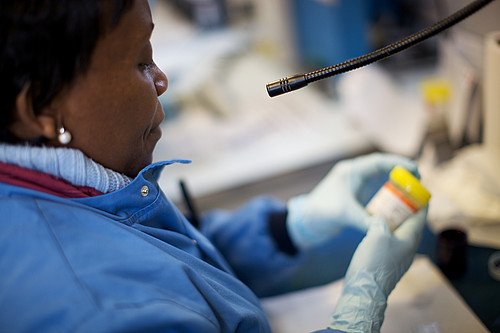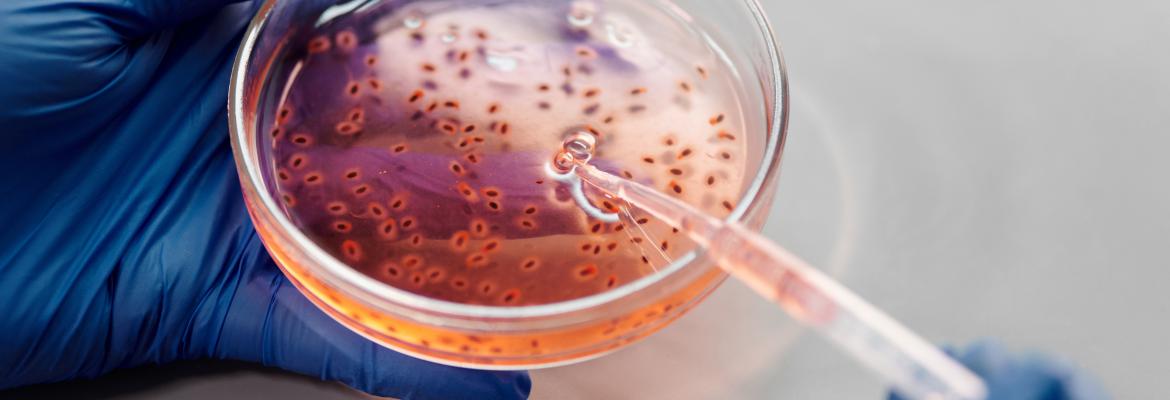Clinical Genetics in the East of England
Clinical Genetics is the medical specialty which provides a diagnostic service and advises individuals or families with, or at risk of, conditions which may have a genetic basis. Genetic disorders can affect any body system and any age group. Clinical Genetics generally work in multidisciplinary regional genetic centres, along with genetic counsellors, molecular geneticists, and cytogeneticists. With the current fast pace of development in genomic medicine, they are increasing their roles integrating genomic medicine into other branches of healthcare.
The regional genetics service is based at Addenbrooke's, where regular clinics are held. It also provides clinics in the other main hospitals within the region (Bury St Edmunds, Lowestoft, Huntingdon, Ipswich, King's Lynn, Norwich, Saffron Walden and Peterborough) but all staff are based at Addenbrooke’s.
Attractions of the Specialty 
Clinical genetics is mainly an out-patient specialty with normal daytime working hours during week days only. There is a vast range of conditions seen and the clinical variety and diagnostic challenges are probably unrivalled by other hospital specialties. There are opportunities to develop sub-specialist interests in; neurogenetics, cancer genetics dysmorphology, cardiac genetics, endocrine genetics, eye genetics, renal genetics, prenatal genetic, genodermatoses, genomic medicine and bioinformatics. However at present most consultants in Clinical Genetics maintain a general interest and hold clinics encompassing all of these aspects. There is wide scope within the specialty to combine clinical and research interests and academic research towards a higher degree is frequently part of training. There is continuing close links with the Sanger Centre in Cambridge, close collaboration with many academic departments within the University of Cambridge and major national genomic projects (e.g., Deciphering Developmental Disorders, 100,000 Genomes) These ensure that clinical genetics remains an exciting and fast-moving specialty. More information can be found at the Clinical Genetics Society and the British Society of Genomic Medicine.
Training programme
The training programme (standard length four years) is based in the regional genetics service. The East of England Deanery training programme provides training in all aspects of the curriculum through a combination of both general genetics clinics, specialist clinics, multidisciplinary meetings, and ward referrals. Specialist clinics in cardiac genetics, eye genetics, neurogenetics, Huntington Disease, cancer genetics, endocrine genetics, renal genetics, prenatal genetics and paediatric genetics are held at Addenbrooke's. Trainees will combine experience in general clinics with exposure to a variety of specialist clinics during their period of training. There are also plenty of research opportunities and several members of the department have active research interests in a variety of areas. This is based in the Academic Department of Medical Genetics at Addenbrooke's. There is also the opportunity to apply for the Post Graduate Certificate in Genomic Medicine.
Essential qualifications for entry and personal qualities
- Completion of a training programme in a relevant specialty to a level suitable for ST3 entry
- Documented evidence of completion of full membership examination (e.g. MRCP(UK))
- Flexible approach and ability to keep up to date in a fast-moving specialty
- Rigorous approach to diagnosis and risk assessment
- Good communication skills are essential
- Good leadership skills — most consultants are responsible for supervising the work of junior doctors and genetic counsellors and for developing guidelines for risk analysis and counselling for common conditions
The training programme of 4 years is based in the Regional Genetics Service. The East of England Deanery training programme provides training in all aspects of the curriculum through a combination of both general genetics clinics, specialist clinics, ward referrals, laboratory attachments in our region and opportunities for participation in specialist training in the four London training centres and elsewhere. General clinics are held at Addenbrooke's and at district hospitals throughout East Anglia (Hinchingbrooke, Peterborough, Queen Elizabeth II Hospital in King's Lynn, West Suffolk Hospital at Bury St Edmunds, Ipswich, Norfolk & Norwich Hospital in Norwich and Saffron Walden. Specialist clinics in cardiac genetics, eye genetics, neurogenetics, Huntington Disease, cancer genetics, endocrine genetics, renal genetics, prenatal genetics and paediatric genetics are held at Addenbrooke's. Trainees will combine experience in general clinics with exposure to a variety of specialist clinics during their period of training. There are also plenty of research opportunities as several members of the department have active research interests involving neurogenetics including primary microcephaly, pain genetics, intellectual disability and Hereditary spastic paraplegia, genomic disorders, renal genetics, and many more aspects of cancer genetics. This is based in the Academic Department of Medical Genetics at Addenbrooke's. There is also the opportunity to apply for the Post Graduate Certificate in Genomic Medicine and ample opportunities for research throughout the Addenbrooke's Biomedical Campus, The University of Cambridge and the Sangar Institute in Hinxton.
- Completion of a core medical training programme or equivalent.
- Documented evidence of achievement of level 1 competencies in general internal medicine (acute).
- Documented evidence of completion of full MRCP(UK) Examination.
- Flexible approach and ability to keep up to date in a fast-moving specialty
- Rigorous approach to diagnosis and risk assessment
- Good communication skills are essential
- Good leadership skills — most consultants are responsible for supervising the work of junior doctors and genetic counsellors and for developing guidelines for risk analysis and counselling for common conditions
Information is available from the JRCPTB website giving detailed guidance on the Clinical Genetics assessment blueprint and curriculum.
